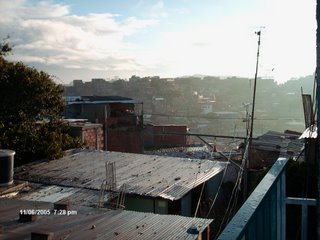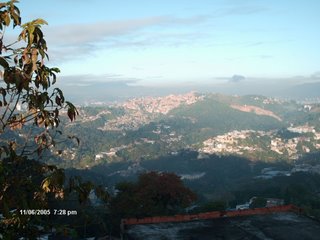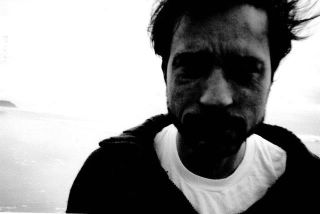La Vida Dolorita - Part 1: Short Walk, Long Trip
I can´t think that the goal of a global justice movement is to try to turn the whole world into a barrio. Although, some middle/upper middle class folks in Venezuela are worried that the "socialist" policies of Hugo Rafael Chavez Frias intend to do just that.
Likewise, writing this from the upper class urban neighborhood of El Viñedo in the wealthy area of Valencia, it can´t be true that material justice on a global scale means we work to turn every barrio into a glittering landscape of glass walls and manicured lawns. For one, there just aren´t enough resources in the world for all the humble folk to live like gringo wanna-bes (that´s not my term, that´s what Valencians say about the people in this sector). It´s easy for me to criticize the materialist aspiriations of better off Venezuelans, for lots of reasons - one significant one is that they live a lifestyle that is very similar to many Portlanders, and they do that when there is much more obvious material inequality right in their face. In a way, it´s refreshing, because it´s so unapologetically classist, it avoids a lot of the hypocrisy we can observe in white liberal areas of the US, folks who imagine themselves working for change, but quite disconnected from the reality of those who suffer.
 Nope, the "cifrinos" here say, I´m not poor, and I´m not gonna be poor, and I have the right to make my life as "good" as I can make it.
Nope, the "cifrinos" here say, I´m not poor, and I´m not gonna be poor, and I have the right to make my life as "good" as I can make it.A side note for a later posting: it may be that a definition of socialism questions just this assumption: Do you have the right to have your life as good as you can make it, at the expense of others?
I don´t want to glamorize life in the barrio of Petare, but I don´t want to stereotype it either. I do want to try to write something that makes the people who live there more real. There are millions of totally real people living in barrios in South America. They go to work, and have kids, and go to church. Sometimes they have radio stations. Sometimes, shooting happens. Sometimes, drugs are sold. Lots of times, people hang out on the street and talk real loud, and lots of times, men drink beer in packs. And lots of times, people dress up and comb their hair to go to school and put on cologne and a nice shirt, and hopefully, nobody will know that they live in the barrio.
 Petare is a huge mass of people, terra cotta, and tin. Reportedly the largest barrio, in terms of population, in S. America. Entire bus networks ply the twisty, narrow, garbage-strewn streets, passing innumerable murals, some government-related, some community designed, sometimes just spraypaint on the wall. Less formal transportation networks exist, too - like the carritos (basically an old model US car, quite beaten up, that stuffs five passengers at 1,500Bs each) that take me from the Palo Verde Metro station up to La Dolorita where I live, or the jeeps which carry folks 6 or 7 at a time up into the hills above Caracas. And mototaxis, too: more expensive, but they`ll get you around the thought-stifling traffic james that are endemic in Venezuela.
Petare is a huge mass of people, terra cotta, and tin. Reportedly the largest barrio, in terms of population, in S. America. Entire bus networks ply the twisty, narrow, garbage-strewn streets, passing innumerable murals, some government-related, some community designed, sometimes just spraypaint on the wall. Less formal transportation networks exist, too - like the carritos (basically an old model US car, quite beaten up, that stuffs five passengers at 1,500Bs each) that take me from the Palo Verde Metro station up to La Dolorita where I live, or the jeeps which carry folks 6 or 7 at a time up into the hills above Caracas. And mototaxis, too: more expensive, but they`ll get you around the thought-stifling traffic james that are endemic in Venezuela.To get to my habitacion, I ride the Caracas metro, line 1, all the way out to the Palo Verde stop, the last one on the lane, the stop right after the Petare stop. This puts me into urbanizacion Palo Verde, and the nearby Centro Comercial Palo Verde. I come out of the metro, and ride a carrito up into the cerros (hills, but also another name for groups of barrio dwellings). First, we pass the high rise apartments of the urbanizacion, then we get to a kind of greener area, basically, the side of a cliff that`s too steep for ranchos (the names of the dwellings themselves). Once we emerge from this part, we´re in Parroquia La Dolorita (just like New Orleans, Venezuela uses parroquias. A parroquia is bigger than a neighborhood, but smaller than a municipio - a municipio is kind of like a county, and a parroquia is something like the way we use the word city in large urban areas - Beaverton is a City, and so is Troutdale, and Oregon City - an administrative zone within a municipio.)
Anyway, once we make a hairpin turn onto the carretera (highway) principal Dolorita-Mariche, you pass a McDonald´s on the right, and enter an industrial zone that courts the edges of the carretera and the hills. It´s sort of surprising at first, because you wouldn´t expect there to be large factories and warehouses so high up in the hills, but there they are. Interesting note about McDonalds: Whereas fast food in the states is generally pretty cheap, in Venezuela, it´s rather expensive, and really focused on getting the kids to want to go. A McMeal of some sort is about 8,000 Bs, and a really good meal in a cheap restaurant with soup, fish, rice, fried plantains, juice, and an arepa, can be as low as 5,000 Bs. Sort of strange, but fast food is exotic (though very common), not a just a cheap, fast way to eat, and that accounts for the way it operates in this culture.
About 10 minutes to one hour later (depending on traffic), passing the noteworthy Catholic church my host family attends, I arrive at Dolorita central. This area is always busy, especially on the weekends, and was a little intimidating at first, but nobody bothers me, and often, someone calls out to me that I have met. There´s a panaderia with some yummy deserts and good bread, a butcher shop (the meat is not so good, but it´s open late), a police module (fact is, where the police are in the barrios, is where it´s tranquilo), a supermarket and a Mercal (the low cost government grocery stores). From this spot, 7 streets go off in different directions. I walk up one of them, quite steep, for about 5 minutes. I pass a basketball hoop and a small bodega where we can buy beer, cigarrettes, and soda, and just past that, the last gate on the left, is the stairway to my temporary residence.
So, if you want to drop by, you can probably find me. Just ask around for the gringo at the community radio station.


6 Comments:
Interesting, what would you say is the definition of a 'barrio' in Venezuela? cuz some places i've been, barrio just means neighborhood. Are they specifically places where the poor have built their own communities on squatted land? or does it just mean poor neighborhood? is it synonomous with 'favela' in Brasil, 'colonia' in Mexico?
Good Question.. I had been a little confused by this. The term is used differently. Generally, a barrio is a neighborhood of folks that are kind of poor, or very poor. Favela and Colonia are the words they use for the actual habitations. In Venezuela, they use Rancho or Cerrito to refer to the homes people live in.
Here, the word barrio is used somewhat informally to refer to a poor neighborhood. When a barrio gets really big, it might become a parroquia. Petare and La Dolorita are communities that started out as barrios, and now, have reached the status of parroquias, including dozens of barrios. The barrio jose felix ribas in Petare has the largest concentration of people of any south american barrio, so i´m told.
Well it was long time ago that your wrote this blog. I live here in Venezuela and never thought I would find all this information about La Dolorita, I mean so much details you give. Any way, what brought you here, how did you ended up there, did you liked it? I have lived all my life at Caracas, and of course I am one of those (social class) who is always being insulted by the president (oligarca) but recently started visiting the Petare Barrio (yes it is the equivalent to favela, they have built their own houses, many don’t have running water, and please don’t ask how they shower or anything else related to a bathroom, power electricity is taken from the streets, that means they don’t pay for it) specifically a sector called La Lira witch comes just after La Dolorita (it is a smaller sector) and they do still have many needs, my biggest fear are the shootings that you never know when it can start and if you are in the middle of it. I am visiting as part of a mandatory Community Service, we work with the kids for that sector, even though they have many needs (including love from parents) they are charming kids and that’s why I have kept visiting them and try to help in some way, I just don’t know how to start or sometimes I even think Is it worth it? Will it make a difference? and the answer I have found up to now is that that little kid will some day thank God for this support he is receiving. Hope I am not wrong.
Hope to hear from you, (sorry if I have many mistakes, remember this is not the language we use)
hola federico, pana cifrino je je! Thank you very much for your comment, que chevere que after 3 years to have someone in Venezuela read my blog! I wish I could respond to you directly, because I would be very interested in talking to you. Your comments come to my email, so if you want to send an email address, please do so, I can delete the comment afterwards.
most of your questions about why I was there and what I was doing can be answered by reading the rest of the blog. When I was there, I never heard of someone from clase media alta visiting the barrios for mandatory community service.. While I can guess that many people hate this, I think it's a very interesting development, and would love it if you commented further on this blog... I'm hoping to come back in a year or two and do another 6 months to see como va "la revolucion" One little piece of advice, about you making a difference - the zonas populares are complicated and messy, it's true, there are many problems. In my opinion, focus on what you can learn from them, tu paisanos, and your impact on them will take care of itself. cuidate hermano
Hi, good to hear from you, honestly I had just read this part (Nº 1) of the blog when I wrote my post, days after I discovered the other entries and I kept reading. I must admit that some parts were funny, I liked when you describe how the different waters are use to clean, I have lived that during my community service, “Hey don’t use that water, go get some rain water”. I also liked that fact that I recognized the priest that is in one of your pictures (quema de Judas) I think he has many years in the community.
Did you ever heard about Barrio El Guamo? (it is passing La Dolorita, passing Los Bloques)
Up to what I know, many students are working inside Petare (as Community Service) in order to get a degree (UCV, Santa María, UNIMET) , yes some might hate it is mandatory, but some others do help a lot and keep helping inside the communities once their mandatory Community Service has ended. Even the "upscale" university that is near Petare (Terrazas del Ávila) guess you know which I am talking about.
Drugs, Gang members (or malandros, who commit murders and robberies), unplanned pregnancy, lack of values, mountains of trash, etc are part of their daily life; I admit that since I have been visiting I am more thankful for many things I took for granted.
Traffic is chaotic in those narrow streets, I admire those who go to work to “Caracas” I have been told that they can take more than 1.5 Hrs (at 6:00 am) to get to Palo Verde Metro Station. That’s why people try to own a motorcycle or use the Moto-Taxi.
I respect your opinion about “La Revolución” that it is the solution for the needed ones and for Venezuela as a country, but I don’t agree with the way its been handled, I mean I think that too much is said and too little is done. I might even say that he is using the needed ones, giving them hope, and just giving them some crumbles or “what is left”, I think there has been enough resources to do much more to help “al pueblo”.
Hey I was just checking my IE "favorites" web pages and there it was your blog; did you ever came back to Venezuela, La Dolorita? Hope to hear from you
Post a Comment
<< Home